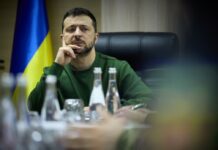After being elected president, Volodymyr Zelensky decided to make a key bet on infrastructure upgrades.
“I would like to be a president who will be remembered as the person after whom roads appeared in Ukraine. I want to drive on the roads and not be ashamed,” he said.
A record amount for the entire history of Ukraine was allocated for the ambitious project – over UAH 120 billion. In proportion to the growth of funding, the attention of the media and society to the topic of road construction has also increased.
In 2020, the president’s team heard many accusations. At first, critics criticized that the announced plans were too ambitious and impossible to implement in time. Criticism later escalated into direct allegations of corruption.
Officials responsible for the presidential project have denied the allegations, saying the road issue has been over-politicized.
The Office of the Prosecutor General, who recently began inspecting Zelensky’s offspring for corruption, should put an end to this issue.
Who was the ideologue of the “Great Construction”, how much money was allocated for roads, what they went for and why there is more and more talk about corruption around this topic?
How it all began
Yuri Golyk is called one of the ideologues of the Great Construction project. Despite being well known in the infrastructure sector, he never worked in the civil service. All positions held by him were formally called “advisor”.
“I do not want to become an official and do not want to declare. I don’t want any problems for the next ten years from a business point of view, because I won’t be able to do anything. I can be an advisor,” Golyk said in an interview with Liga.net.
During Petro Poroshenko’s presidency, he worked as an adviser to the head of the Dnipropetrovsk Regional State Administration, Valentyn Reznichenko, and was responsible for the development of the region’s infrastructure, where 2,000 projects were implemented over five years.
“Big construction” or big long-term construction?
After the change of power, Zelensky fired Reznichenko (the day before, the president reappointed Reznichenko head of the Dnipropetrovsk Regional State Administration), and Golyk became an adviser to then-Prime Minister Oleksiy Honcharuk, through whom he was able to convey his vision of the country’s infrastructure.
“For Zelensky, roads and infrastructure were a priority. It required qualitative changes in the shortest possible time. The president supported everything related to infrastructure. That’s how the “Great Construction” project was born, says the interlocutor of the EP from the team of former Prime Minister Goncharuk.
Zelensky liked the case in terms of quality and speed of implementation. There were strict requirements for contractors: a guarantee of coverage of at least five years, construction not in sections, but from start to finish. The construction of the Zaporizhia-Mariupol road was demonstrated to the President as a successful project.
“The concept of the project was as follows: to build and repair schools, kindergartens, sports facilities, hospitals efficiently and quickly, so that they could be reached by good roads. Then this idea was transformed into the project “Big Construction”, one of the mottos of which is “Sew the country”, – adds the interlocutor.
As a result, Golyk “survived” Goncharuk. After his dismissal, he moved to another formal position in the Coordinating Council for the implementation of the project “Large Construction”, created by presidential decree in the summer of 2020.
In his new status, he continued to oversee infrastructure projects, for which a record amount of funds was allocated in 2020.
Big goals – big money
During the conversation with journalists, those responsible for road management announced the various amounts that were planned to be spent on roads in 2020. When talking about the amount of funding, officials often used the words “record” and even “crazy.” The universal figure is over UAH 100 billion.
According to EP sources, in 2020 it was decided to allocate UAH 121.8 billion for roads. However, not all this money went to the road. What is included in this amount?
What is hidden behind Zelensky’s “Great Construction”?
The lion’s share – about UAH 85 billion – is Ukravtodor’s money for roads of general importance. Almost 22 billion hryvnias are funds for local roads used by regional state administrations. More than 5.5 billion hryvnias were allocated to repay debts of previous years on loans and bonds of Ukravtodor.
The total amount also includes money for road maintenance and safety funds, which go to the Ministry of Infrastructure.
The main sources of funding for the road construction and repair program: Road Fund (excise duties on fuel and vehicles) – UAH 31.5 billion, funds received under state guarantees – UAH 19.3 billion, part of the amount of Naftogaz’s winnings in the Stockholm Arbitration, which came to the “coveted” fund – 35 billion UAH, as well as money from international financial organizations
In general, the financing of road construction increased significantly during the previous government. In 2016 and this amount amounted to almost UAH 14 billion, in 2019 – about UAH 55.5 billion, but to a record level of funding increased under Zelensky.
Another question is whether it was expedient to spend the lion’s share of the 66-billion “coveted” fund on infrastructure, namely part of Naftogaz’s funds from winning the arbitration?
“The $ 3 billion that was won was planned to be spent on building Ukrainian infrastructure. But most of these funds were the basis of the “coveted” fund. In other words, we have transferred money for rescue (for the fight against COVID-19. – EP) from the development of infrastructure, from the development of the economy, provided that if there is enough money for rescue, we will be able to return it to certain programs. That’s what happened, “Prime Minister Denis Shmygal explained in an interview with the UE.
Ukravtodor says that, in fact, this is “a certain communication mistake.” Like, “Naftogaz” couldn’t transfer these means to “Ukravtodor”, therefore decided to make it through “covid” fund.
“Internally, it was obvious to everyone that this year the state will try to fight the consequences of the coronary crisis with the help of infrastructure. “The Big Construction program itself is about increasing the country’s GDP,” the road ministry said.
Officials, in particular, cite a study by Ukraine Economic Outlook, which notes that the economic downturn in the 4th quarter without the “Big Construction” would have reached 11%. The report notes that infrastructure projects maintained between 2.5% of GDP in the second quarter and 5.1% and 7.3% in the third and fourth, respectively.
The plan is a fact
Criticism of the project began immediately after the publication of plans for the construction and reconstruction of 4.2 thousand km of state roads and 2.5 thousand km of local roads. Opponents said the plans were unrealistic.
Before the end of the road works season, Ukravtodor reported that in 2020, 10% of the entire state road network was renovated, and by December the plans had been fulfilled by more than 90%.
“Of the 4.2 thousand km of state roads planned for 2020, 3.9 thousand km are at the finish line. This means that the sites are already being put into operation, the installation of the top layer is coming to an end or these works have already been completed, ”said Ukravtodor chairman Oleksandr Kubrakov.
What works are we talking about?
According to the results of monitoring the CoST Ukraine initiative, in early 2020, agreements were concluded for the construction of only 14.35 km of roads. Another 77 km was planned to be reconstructed and 450 km to be overhauled. It was planned to make current and average repairs on 4,395 km of roads.
“Almost 90% of the total volume is the current average repair. “It can’t be attributed to ‘build’ (as the president said. – EP), because according to Ukrainian standards, it’s not even work, but services,” – said the former state commissioner of the AMC Agia Zagrebelska.
Nevertheless, the participants of the CoST Ukraine initiative showed a positive trend: in contrast to previous periods, in 2020 Ukravtodor carried out most of the current medium-sized repairs using reinforced technology.
“The road base is being replaced and strengthened, which brings the technology of current average road repairs closer to the technology of capital repairs. Accordingly, the durability of repaired roads is significantly increasing,” commented the director of CoST Ukraine Svyatoslav Abramov.
He called the current average repair by the strengthened technology “analog of capital with lower cost”. How durable will be the roads repaired with this technology, can be estimated in a few years.
Key claims
The main accusation against Ukravtodor is that the company has formed a “cartel” of contractors who receive the lion’s share of orders.
The leaders in the value of won purchases are the limited liability companies “Avtomagistral-Pivden”, “SUNP” Avtostrada “,”Techno-Bud-Tsentr”, “Onur Construction International”, “Rostdorstroy”and “PBS”.
This group is called the “road cartel”. According to Our Money, it won 62% of road tenders. In total, since the beginning of 2020, these six have mastered more than 55 billion hryvnias. Ukravtodor responds to criticism that the same situation is observed in foreign markets, and that this is quite normal.
“We often compare the situation on the road market of Ukraine with other countries. The dynamics are the same everywhere: the two or four largest companies occupy half of the market. The rest is shared by smaller companies,” the EP said in response to a request.
“This is due to the fact that the state as an institution does not want to take risks in projects worth tens of millions of dollars,” the company said.
However, according to the press service of Ukravtodor, the situation is changing here: companies that in previous years took contracts for 100-150 million UAH, in 2020 were able to grow to more than 1 billion UAH.
Another complaint to the management of Ukravtodor is the introduction of non-competitive requirements for bidders in order to restrict competition. During the year, the press repeatedly drew attention to the so-called tender sharpening.
One example is the so-called experimental sharpening. Yes, to participate in the tender for the overhaul of state roads
UAH 1 billion or more, the participant must prove that in the last three to five years he has fully performed such types of work.
Another “sharpening” became known during a record tender for UAH 12 billion. The firm had to prove its annual income, which had to be at least a third of the contract value. In monetary terms, it amounted to UAH 3.77 billion. The AMCU ordered Ukravtodor to remove this discriminatory requirement.
Another example is that at the time of the tender announcement, the company must have an asphalt plant at a distance of up to 150 km from the repair site.
“If we want to fulfill the planned plan and get quality roads, the market must have strict uniform rules,” Ukravtodor said in response.
Kubrakov’s office acknowledges that the methodology has indeed created problems for small companies that do not have the capacity to work on roads of international importance, but call these challenges “healthy.”
“Responsible business can be relocated if it pays more attention to the employment of specialists, rental or purchase of equipment and technology. Statistics of 2020 confirm: there is a growth of companies of all sizes, including in the market of local and municipal roads”, – declared in press service.
Another accusation concerns a significant increase in the cost of work, although Ukravtodor stated that there were no drastic changes. In fact, in some cases the cost of work has decreased, and in others it has almost doubled.
According to CoST Ukraine, the average cost of construction of 1 km was UAH 90 million – 14.3% less than in 2019. The cost of reconstruction decreased by 45% to UAH 36 million, overhaul – increased by 4% to UAH 25.1 million.
The cost of 1 km of average current repairs, which was planned to be the largest (4,395 km), averaged UAH 11.2 million or 92% more than in 2019.

Abramov stressed the need for a more detailed study of each object. This is what the Office of the Prosecutor General is currently doing.
Ukravtodor states that they have nothing to hide. “I am personally responsible for every hryvnia spent. Any speculation will end, and the built roads will remain for decades, “Kubrakov said.
Judging by this rhetoric, he has no plans to resign. Moreover, information has recently appeared about his possible promotion to the post of minister.
It seems that Kubrakov is satisfied with the OP, but the situation may change. Especially if the inspection of militiamen finds that in Zelensky’s project there was a large-scale embezzlement of means as it is told also by ex-employees of OP.
Zelensky has repeatedly demonstrated the ability to easily say goodbye to people who could harm his rating. Even the closest associates of the head of state, who made a lot of efforts to win the presidential election, lost their seats. Although, of course, there are exceptions.









